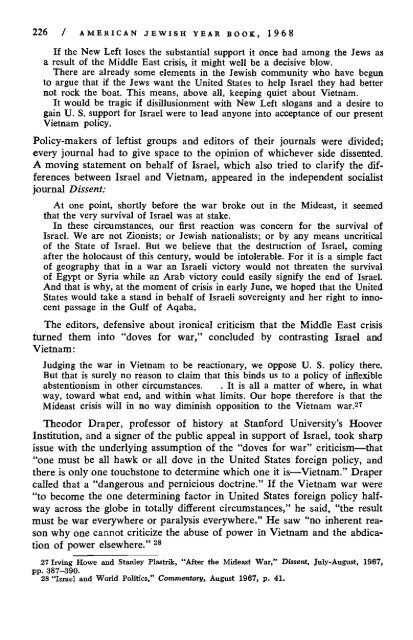1968_4_arabisraelwar
Create successful ePaper yourself
Turn your PDF publications into a flip-book with our unique Google optimized e-Paper software.
226 / AMERICAN JEWISH YEAR BOOK, <strong>1968</strong><br />
If the New Left loses the substantial support it once had among the Jews as<br />
a result of the Middle East crisis, it might well be a decisive blow.<br />
There are already some elements in the Jewish community who have begun<br />
to argue that if the Jews want the United States to help Israel they had better<br />
not rock the boat. This means, above all, keeping quiet about Vietnam.<br />
It would be tragic if disillusionment with New Left slogans and a desire to<br />
gain U. S. support for Israel were to lead anyone into acceptance of our present<br />
Vietnam policy.<br />
Policy-makers of leftist groups and editors of their journals were divided;<br />
every journal had to give space to the opinion of whichever side dissented.<br />
A moving statement on behalf of Israel, which also tried to clarify the differences<br />
between Israel and Vietnam, appeared in the independent socialist<br />
journal Dissent:<br />
At one point, shortly before the war broke out in the Mideast, it seemed<br />
that the very survival of Israel was at stake.<br />
In these circumstances, our first reaction was concern for the survival of<br />
Israel. We are not Zionists; or Jewish nationalists; or by any means uncritical<br />
of the State of Israel. But we believe that the destruction of Israel, coming<br />
after the holocaust of this century, would be intolerable. For it is a simple fact<br />
of geography that in a war an Israeli victory would not threaten the survival<br />
of Egypt or Syria while an Arab victory could easily signify the end of Israel.<br />
And that is why, at the moment of crisis in early June, we hoped that the United<br />
States would take a stand in behalf of Israeli sovereignty and her right to innocent<br />
passage in the Gulf of Aqaba.<br />
The editors, defensive about ironical criticism that the Middle East crisis<br />
turned them into "doves for war," concluded by contrasting Israel and<br />
Vietnam:<br />
Judging the war in Vietnam to be reactionary, we oppose U. S. policy there.<br />
But that is surely no reason to claim that this binds us to a policy of inflexible<br />
abstentionism in other circumstances. . It is all a matter of where, in what<br />
way, toward what end, and within what limits. Our hope therefore is that the<br />
Mideast crisis will in no way diminish opposition to the Vietnam war. 2T<br />
Theodor Draper, professor of history at Stanford University's Hoover<br />
Institution, and a signer of the public appeal in support of Israel, took sharp<br />
issue with the underlying assumption of the "doves for war" criticism—that<br />
"one must be all hawk or all dove in the United States foreign policy, and<br />
there is only one touchstone to determine which one it is—Vietnam." Draper<br />
called that a "dangerous and pernicious doctrine." If the Vietnam war were<br />
"to become the one determining factor in United States foreign policy halfway<br />
across the globe in totally different circumstances," he said, "the result<br />
must be war everywhere or paralysis everywhere." He saw "no inherent reason<br />
why one cannot criticize the abuse of power in Vietnam and the abdication<br />
of power elsewhere." 28<br />
27 living Howe and Stanley Plastrik, "After the Mideast War," Dissent, July-August, 1967,<br />
pp. 387-390.<br />
28 "Israel and World Politics," Commentary, August 1967, p. 41.


